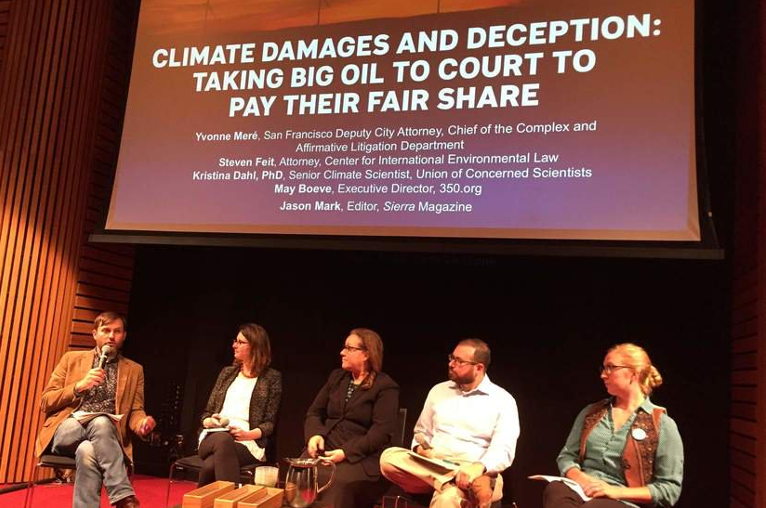In San Francisco this week, Fossil Free California hosted a panel discussion on the most recent municipal litigation against the fossil fuel industry.
Last year, San Francisco and Oakland sued the world’s five largest investor-owned fossil fuel producers over predicted climate change costs to these cities.
The municipalities sued on the basis of public nuisance — essentially claiming that the oil companies should be held financially accountable for the costs of adapting these cities for a changing climate, since it was fossil fuel pollution that largely fueled the global warming that is endangering California communities.
At the event, Kristina Dahl, senior climate scientist from the Union of Concerned Scientists, described these damages as “near term” threats to both homes and public infrastructure.
“What we’ve realized is that long before our homes and roads are completely under water with high level tides [in the next century], we are going to experience a whole lot of nuisance level flooding [in this century].”
“Our report shows the number of homes at risk of flooding chronically, that is, every other week, due to sea level rise. The city of San Francisco is looking at losing 4,000 homes by the end of this century. San Mateo County is looking at over 30,000 homes at risk. Nationwide we’re looking at 2.5 million homes across the United States within this century. In just the next 30-year mortgage timeframe, there are 300,000 homes at risk, worth over a trillion dollars.”
She concluded that,
“it’s a fair question to ask, should those most responsible for producing greenhouse gases share in that burden?”
In June, however, Judge Alsup of the US District Court for the Northern District of California declined to hear San Francisco’s public nuisance case at trial. Judge Alsup’s opinion questioned if it was fair to place the blame for global warming on those who “supplied what we demanded.”
But research by the Center for International Environmental Law has pointed to evidence that the oil industry has manipulated that demand — as well as the information available to the public and the government — on the negative consequences of their products.
San Francisco Deputy City Attorney, Yvonne Meré, assured the audience that the city is in the process of appealing that ruling.
Records from the archives of these oil companies have shown that executives knew, as early as 1957, about the threat of climate change, and they incorporated this knowledge into their operational plans for building projects in the Arctic as early as the 1980s.
Steven Feit, of the Center for International Environmental Law, explained:
“They also had the necessary expertise to understand the context and the importance of what they were seeing. They researched hurricane formation. They looked into paleoclimate historic sea levels, carbon concentrations in the atmosphere and the way that those interacted with historic temperatures so that they could find oil offshore.”
“They were extremely coordinated,” Feit alleges.
According to Feit, oil industry giants were also aware that oil was not the only choice of viable energy supplies.
“They also knew of alternatives. […] Since the 1940’s they were studying carbon sequestration from gas streams. […] They were looking into solar patents by the end of the 1970s. Basically all of the US solar industry was owned by the oil industry. And instead of releasing it into the public and allowing us to take a different path, they took all of this technology and mostly just sat on it,” Feit said.
At present, California judges remain split on the responsibility of the courts to hear the public nuisance claims. Deputy Attorney Meré noted that unlike San Francisco’s case, in which Judge Alsup held and then dismissed the case in federal court, Judge Chhabria (also of the Northern District Court of California) ruled that state courts should rule in the San Mateo County case.
May Boeve, Executive Director at 350.org, elucidated the importance of these cases beyond simple wins or losses in the courtroom over funds to help communities adapt to these enormous climate changes. Boeve suggested that these cases clarify questions of responsibility for the public:
“The reason it’s important to have a known target or villain in this social movement is that we know as consumers we are all responsible in small part for this problem. But that can be so demobilizing, and that feeling has been so effectively used by industry [in order] to avoid their share of the responsibility. And it’s time to hold them to account.”
Boeve added, “Let’s be clear: it’s not that we created a villain, the villain was already there, especially for communities living next to coal and oil plants.”
Feit noted that there are dozens of other climate cases involving legal strategies to hold companies accountable for private and public ecological damages, including this farmer in Peru whose case against German Energy Giant, RWE, could make history in a German court over the threats climate change poses to his hometown, which sits near a flooding glacial lake.
Alex Lenferna commented on the importance for those of us in the global north to help find ways to map responsibility and pay for the climate damages that are disproportionally suffered by those in the global south.
The claims are growing with the evidence.
As Dahl explained, recent findings show that nearly two thirds of the total carbon dioxide and methane emissions since the late 1800s is attributable to 90 fossil fuel companies (Ekwurzel et al 2017).
As the history of the fossil fuel industry has revealed itself, scientists have developed clear models for quantifying and attributing the damages to relevant parties in the extractive industry. It may just take the law a moment to catch up.
Image credit: Deborah Moor, Union Of Concerned Scientists





